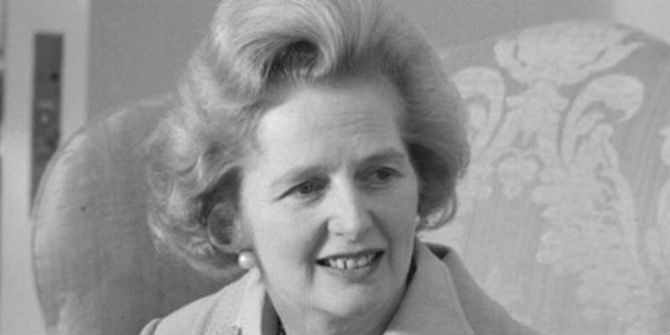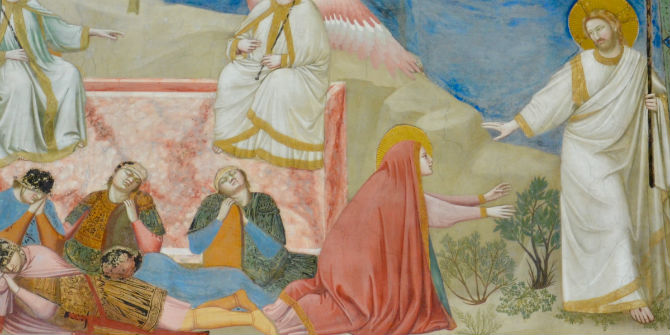 The question of how Margaret Thatcher would have voted in the forthcoming EU referendum has exercised a number of Conservative politicians. Her former adviser, Lord Powell, has argued that she was a pragmatist who would have at least considered supporting the Remain side. David Shiels says the ex-PM was always a Eurosceptic whose views hardened during her premiership. Had she stayed in office longer, we might well already have left the EU.
The question of how Margaret Thatcher would have voted in the forthcoming EU referendum has exercised a number of Conservative politicians. Her former adviser, Lord Powell, has argued that she was a pragmatist who would have at least considered supporting the Remain side. David Shiels says the ex-PM was always a Eurosceptic whose views hardened during her premiership. Had she stayed in office longer, we might well already have left the EU.
‘What would Maggie do? Say Yes, Yes, Yes! To Europe’. This was the provocative title of a Sunday Times article by Lord Powell of Bayswater, which has prompted a furious debate about the Iron Lady’s views on Europe. The intervention by her sometime Private Secretary for Foreign Affairs was criticised by some Conservatives as a ‘new low’ in the referendum debates, an obvious attempt by the In side to influence the debate, and an affront to the former Prime Minister’s legacy. Lord Powell, they claimed, was merely using his association with his former boss to justify his own decision to support continued membership of the European Union.
In fact Powell’s analysis of the former PM’s views on Europe is measured and the original article is worth reading in full. Insofar as anyone is able to comment on Mrs Thatcher’s views on foreign affairs, Lord Powell is one of the most qualified. He was one of her most trusted advisers when she was in Government, perhaps closer to her than any of her Cabinet colleagues. In Charles Moore’s authorised biography of Mrs Thatcher, Powell described his working relationship with Thatcher thus: ‘In a strange sense, it was hard to tell what was me and what was her’. Although Powell knew the mind of his principal better than anyone else who worked for her when she was Prime Minister, he makes it clear that ‘we have no way of knowing now what she would have done’ in the forthcoming referendum. He is surely right to point out that Mrs Thatcher’s record of co-operation with Europe when she was in office contrasts with the views she expressed privately, and after her time in office. In office she was pragmatic about Europe: she understood that deals had to be done and compromises had to be made. There was, as Powell writes, ‘a difference between her excitable rhetoric and her rational decisions’.

What is also true – something that Lord Powell does not fully acknowledge – is that she was always a sceptic on Europe who was deeply and genuinely opposed to the creation of a European ‘superstate’. Her original reasons for supporting Britain’s membership of the EEC were bound up with her views on the Cold War and the sense that Britain was in relative decline when compared with the rest of Western Europe. This is how it was for many Conservatives in the 1970s when Britain was seen as the ‘sick man of Europe’. But even then she had misgivings about the direction of political and economic integration. What is most interesting about Mrs Thatcher is that her views on Europe hardened in office, significant because she was one of the most experienced and long-serving European heads of government. Her misgivings about the European project were made clear in her famous Bruges speech and in her private opposition to Britain’s membership of the Exchange Rate Mechanism of the European Monetary System. After she left office she became convinced that Britain should leave the European Union.
The real problem with the question ‘What would Margaret Thatcher do about Europe?’ is that it looks at the whole issue the wrong way around. The reason the UK is having a referendum on Europe is mainly because the question of Britain’s relationship with Europe was left unresolved at the time she left office. The combination of the Thatcherite reforms at home and the end of the Cold War had a profound effect on Britain’s relationship with Europe, casting doubt on the rationale for continued membership in the view of many Conservatives. In a sense Mrs Thatcher was only beginning to come to terms with these issues when she lost office: indeed her removal as leader of the Conservative Party was inspired by the pro-European wing of the party, reacting against what they saw as her unacceptable attitudes to Europe. The current debates within the Conservative party follow on from this moment, because Mrs Thatcher was denied the chance to work through these issues in office. David Cameron’s renegotiation has so far failed to reconcile Eurosceptic opinion with the idea of continued membership of the European Union. It may require another Prime Minister with the authority of Thatcher before the European issue can be resolved.
This post represents the views of the author and not those of the BrexitVote blog, nor the LSE.
David Shiels holds a PhD from the University of Cambridge. He is a College Research Associate at Wolfson College and had has been an Archives By-Fellow at Churchill College. He is completing a biography of Enoch Powell The Outsider to be published by I.B. Tauris, and provides research for the authorised biography of Margaret Thatcher.






